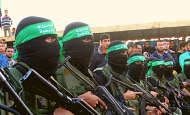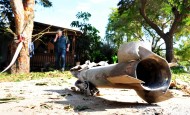HRW Pretends Hamas Doesn’t Exist in Gaza
On July 27, 2021, Human Rights Watch (HRW) published “Gaza: Apparent War Crimes During May Fighting,” alleging that Israel committed war crimes in its May 2021 conflict with Hamas and Islamic Jihad in Gaza. This report, which discusses incidents that have already been extensively covered in the media and by other NGOs (HRW does not disclose whether its representatives in Gaza contributed to earlier media and NGO accounts), serves as another vehicle for HRW’s ongoing campaign lobbying the International Criminal Court to target “Israeli government’s crushing closure of Gaza and its crimes of apartheid and persecution against millions of Palestinians.”
Like many such HRW publications, this one lacks a coherent methodology and ignores basic professional fact-finding standards. Instead, the analysis is predicated entirely on three cherry-picked incidents that are compatible with its pre-determined, long-standing political narrative.
For more thorough research, see NGO Monitor’s “See No Evil: NGOs Turn Terrorists into Civilians in 2021 Gaza Conflict.” NGO Monitor analyzed more than 50 incidents in which Hamas and Islamic Jihad combatants were incorrectly identified by Palestinian NGOs as civilians and in which Palestinian rocket misfires caused casualties and property damage.
Erasing Hamas
Consistent with its usual shoddy research methodology and baseless legal standards, HRW’s “analysis” relies heavily on “eyewitness testimony” to claim that no Hamas or Islamic Jihad personnel, weaponry, or infrastructure was present at these sites allegedly struck by Israel. HRW does not identify how its witnesses were selected, nor does it clarify whether or how it investigated witness affiliations to Palestinian armed groups. Similarly, it does not specify how it verified claims regarding the presence of combat activity or military infrastructure.
In addition, HRW ignores the reality in Gaza, where Hamas threatens retaliation against residents who implicate the terror group. For instance, on May 13, Hamas’ internal security forces instructed Gazans not to cooperate with individuals and organizations from outside Gaza, announcing, “It is prohibited under all circumstances to provide details of events or to send messages and videos that discuss locations of bombing and its outcomes or rocket launching sites of the resistance.”
Notably, on several occasions, HRW claims to have visited blast sites and inspected remnants of ordnance, but not in the immediate aftermath of the alleged Israeli strikes. Unidentified HRW representatives purportedly toured the site of a May 15 attack “on May 23 and June 12,” and “analyzed munition remnants on the roof of an immediate neighbor.”
It is unclear how whether these HRW personnel had the expertise to identify weapons fragments or to verify that the physical environment did not change meaningfully during this time, and that the munitions in question were not manipulated and can be directly attributable to the incident under review. HRW also does not disclose whether their staffers were accompanied by Palestinian officials (aka Hamas) or other actors during its site visits.
Ignoring key Palestinian violations
Major omissions in HRW’s publication are also notable – in particular the failure to mention the dozens of verified Hamas and Islamic Jihad members targeted by Israel during the conflict- many of whom were classified as “civilians” by Palestinian NGOs. Their silence on this central point suggests that HRW accepts the practice of labeling combatants as civilians, and the resulting condemnations of Israel that are generated by this subterfuge.
(For more information, see NGO Monitor’s “See No Evil: NGOs Turn Terrorists into Civilians in 2021 Gaza Conflict.”)
Moreover, when assessing the conduct of Israeli forces, HRW fails to condemn Hamas and Islamic Jihad for positioning their forces and infrastructure among civilians and firing rockets from within population centers, constructing a vast network of tunnels under these same areas, and hiding munitions in homes and civilian buildings. Co-locating military objectives within or near civilian areas is a war crime pursuant to the Fourth Geneva Convention and its Additional Protocols, by which all Palestinian actors are bound.
Sweeping Claims Without Access to Evidence
HRW levels sweeping claims relating to Israeli targeting, without having any access to the necessary information or intelligence. Regarding Israeli strikes against Hamas’ tunnel network, HRW claims that the destruction of an adjacent building was a war crime and that it “did not find any evidence of a military target at or near the site of the airstrikes, including tunnels or an underground command center under al-Wahda street.” The basis for this conclusion is not provided.
In contrast, experts quoted by the New York Times concluded that the damage was consistent with Israel’s explanation that, in attacking a tunnel complex, “the bombs exploded deep underground [and] they unexpectedly dislodged the Abul Ouf Building’s foundations.”
Indeed, Israeli officials labeled the incident a “freak event” and highlighted that Israel did not believe its strikes would cause the building’s collapse.
(For more information on Israel’s obligations under the laws of war and their relevance to the Gaza conflict, see NGO Monitor’s “NGOs Distort International Law with ‘Disproportional’ Casualty Claims.”)
Palestinian misfires and the Al-Masri family
The HRW publication makes only cursory mention of Palestinian rockets that fell short in Gaza, downplaying the resulting deaths and destruction. The refusal by HRW to investigate casualties potentially attributable to “misfired” rockets is also not in keeping with standards required by objective research and reporting, and reflects the political factors that continue to drive HRW’s agenda, under the façade of human rights.
Errant rockets fired by Hamas and Islamic Jihad – directed at Israeli civilians and thus war crimes – also killed Palestinians and caused property damage in Gaza, including to infrastructure. According to the IDF, approximately 15% (680/4,300) of the rockets and mortars launched by Palestinian groups landed within Gaza.
Media reports, quoting the IDF, attribute the May 10 deaths of members of the Al-Masri family to short-falling rockets, while HRW blames Israel. Moreover, contemporaneous accounts of the incident by Palestinian NGOs were uncharacteristically noncommittal and vague, merely describing the incident as “a blast.” Had Israel been the likely source of the strike, these NGOs would have issued detailed and sharply worded condemnations.


